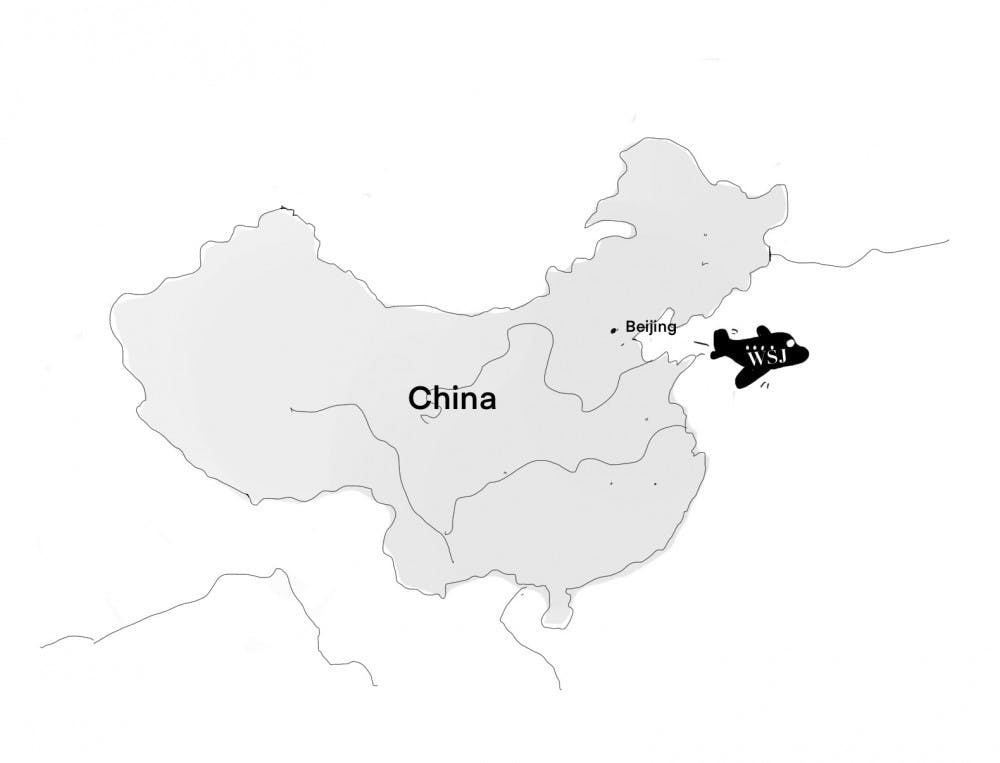On Feb. 19, the Chinese Ministry of Foreign Affairs announced its decision to expel three Wall Street Journal reporters, including University alum Chao Deng ’09. The move marked the country’s first direct expulsion of foreign reporters in over two decades.
Two of the reporters left the country on Feb. 24: Josh Chin, a U.S. citizen and the Journal’s Beijing bureau chief, and Philip Wen, an Australian national. Deng, also a U.S. citizen, remains in the coronavirus containment zone of Wuhan, in central China’s Hubei province.
The journalists’ press credentials were revoked in response to an opinion column published in the Journal on Feb. 3. The headline, “China is the Real Sick Man of Asia,” was described as racist by the Chinese government.
William Lewis, the Journal’s publisher and the chief executive of its parent company Dow Jones, said in a statement that it was not the Journal’s intention to cause offense with the headline. “However, this has clearly caused upset and concern amongst the Chinese people,” the statement continued, “which we regret.”
Zhao Lijian, a spokesperson for the Chinese Foreign Ministry, directed The Herald to a statement telling reporters yesterday that the Journal “has contacted the Chinese side through different channels, admitting it’s wrong to publish the insulting article and saying it has drawn lessons from the episode,” but has not issued an official apology as China has asked them to do.
The Journal’s News and Opinion departments are kept separate, in line with journalistic best practice. This means that none of the targeted reporters were involved in writing, editing or publishing the controversial opinion column.
Walter Russell Mead, the Hudson Institute scholar who wrote the opinion column, was unavailable for comment. An editorial published by the Wall Street Journal’s Editorial Board explained that Mead, a regular contributor to the Journal, did not write the headline.
Chin, Wen and Deng “represent the best traditions of the Journal,” wrote Matt Murray, editor-in-chief of the Wall Street Journal, in a statement following the Ministry’s announcement last week.
Deng graduated from the University with a double concentration in Neuroscience and Economics. She is also a graduate of the Columbia School of Journalism, and joined the Journal in 2012. Her areas of focus include China’s economy and finance, with recent reporting ranging from US-China trade negotiations to hospitals struggling to cope with the fast-spreading coronavirus.
National Security Council spokesman John Ullyot said on Monday of the journalists’ expulsion that “the United States is considering a range of responses to this egregious act,” calling China’s move “yet another attempt to control the press, and prevent the world’s readers as well as investors from reading important stories about China,” according to Reuters. The U.S. Embassy in Beijing did not respond to The Herald’s multiple requests for comment.
The Committee to Protect Journalists said in a statement that “Chinese authorities should immediately restore the press credentials of the three Wall Street Journal journalists and allow the media to report freely in the country.” Steven Butler, the CPJ’s Asia Program coordinator, told The Herald that the CPJ “strongly condemns” the Chinese government’s actions. “They shouldn’t be expelling accredited journalists who don’t break their laws,” he said.
According to Butler, the expelled journalists had been doing fact-based reporting on the coronavirus as well as other topics. “This is a particularly inopportune time for China to be expelling journalists because of the ongoing coronavirus epidemic,” he said, adding that “recent events have shown that free flow of information would have been much better early on” in covering the epidemic. “These are the kind of journalists that China should want to have operating there. They do a really good job of documenting what’s happening in the country,” Butler said.
The Wall Street Journal is currently banned in China. Its website was shut down in 2014, according to its editorial board. In August 2019, the Chinese government did not renew the press credentials of another Journal reporter, Chun Han Wong, after he published an investigative story on the business interests of President Xi Jinping’s cousin in Australia. But this is the first time since 1998 that journalists have been directly expelled from the country while their press credentials are still valid.
The Foreign Correspondents’ Club of China said in a statement last Wednesday that the action taken against the Journal’s reporters “is an extreme and obvious attempt by the Chinese authorities to intimidate foreign news organizations by taking retribution against their China-based correspondents.”
But the expulsion of their reporters has not dampened the Journal’s commitment to covering China “with the highest standards of news reporting,” read Murray’s statement.
“We will continue to write about China,” he added, “without fear or favor and with no agenda but the truth.”





